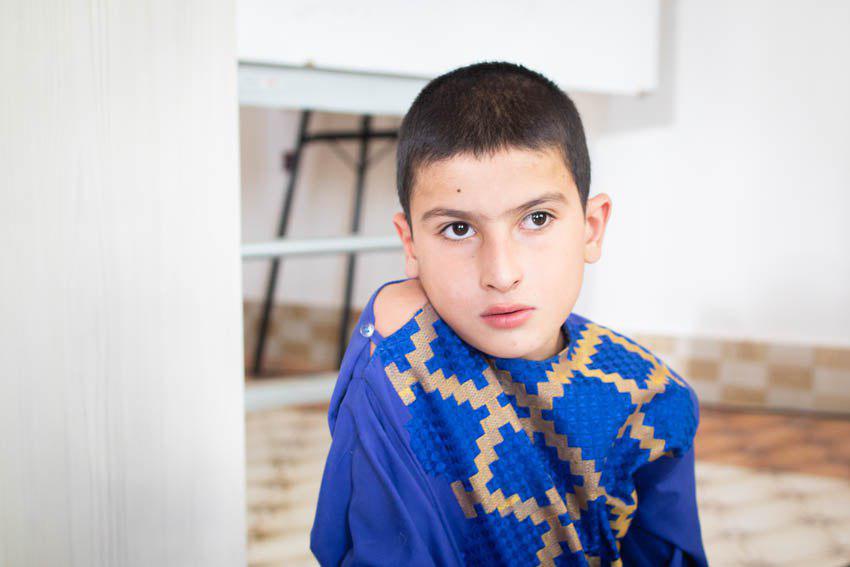In just two months, a family is seeing big changes.
Sadiqa* had no hope that her son, Aziz*, would ever get better. Eight-year-old Aziz struggled with a myriad of problems – he experienced seizures, was unable to walk well or go upstairs, and wasn’t able to go to the washroom by himself. These issues were compounded with behavioural problems, too, and with three other children, Sadiqa was often overwhelmed.
“He couldn’t go alone anywhere. Someone always had to be with him,” Sadiqa said. Aziz would hit himself and his siblings, break things, and walk around the house making lots of noise. “Sometimes he was so disruptive, I would lose control and beat him.”
A lack of services and awareness about mental health mean that many people in Afghanistan are struggling like Aziz and Sadiqa. When people aren’t aware that children can suffer from mental disorders, parents are uncertain why their children are misbehaving or struggling, and don’t have the told to address the issue. That’s why International Assistance Mission’s (IAM) Child and Adolescent Psychiatry Project (CAPP) was developed – to get children with mental health issues and their families the support they need, through a combination of medical treatment, counselling, physical and occupational therapy, and practical coaching.
Challenges for children with mental health problems
Children with mental health problems, like Aziz, are often not accepted into their communities, according to Haqina*, an IAM counsellor working with CAPP. Frequently, when children struggle with mental health issues such as ADHD or epilepsy, they are seen as disruptive, and are hidden away.
“These children are often tied up in the corner of the room by their parents because they don’t know how to deal with them, and they are kept away from the rest of society.” Without parents knowing that mental health issues in children can be addressed, it isn’t surprising that many parents lose hope that their children can change.
Sadiqa had tried everything she could to help Aziz – she had taken him to a number of clinics and hospitals looking for a solution to his problems. Sometimes she received medicine, which helped a little bit, but most often she was told she would need to go abroad to get him treatment. It wasn’t until she came to IAM’s Child and Adolescent Mental Health Centre that she realised change was possible.
After getting a prescription for medicine, the IAM team asked Sadiqa and her son to come to the centre each week to receive counselling and practical support. In just two months, Sadiqa is already seeing some big changes.
Now, Aziz can go to the washroom by himself. He goes outside to play with other children, and listens when his mother asks him to sit quietly. When we met with Sadiqa, she and Aziz both walked up the stairs to meet us, and he sat next to her as she told us their story.

Changes taking place
“[The mental health workers] encouraged me to spend time and with him, doing things like playing football with him, talking with him, going out with him, and [even] to go and play at the amusement park,” says Sadiqa. Before, she didn’t take Aziz many places because of his disruptive behaviour. But now, she brings him with her into her neighborhood or to the bazaar.
The changes in Aziz’s life have affected his whole family. “Because he’s my oldest, his siblings learn from him,” Sadiqa explains. Aziz’s siblings used to do what he did – if he would spit at someone or hit them, so would his younger siblings, assuming it was the right thing to do. But now, as his behaviour becomes more positive, his siblings are also learning these good habits.
CAPP, and IAM’s whole mental health programme, addresses mental health issues holistically, involving the child, the parents, and the community; while medical treatment can be an important factor, the tools families learn together through counselling and therapy also play a key role and strengthen the entire family, like Sadiqa and Aziz experienced firsthand. “I hope we can continue to raise awareness about child and adolescent mental health problems and provide more services and prevention programmes for them, rather than just giving out medicine,” says Haqina. “Some families don’t know what counselling can do. They see that their child has a lot of problems and they think that counselling will take a long time…[and] it can’t work. So instead, they search for a faster solution.” While a faster solution may sound more convenient, it can result in disorders being solved in the short term, but not permanently.
Sadiqa is now hopeful for Aziz, and plans to continue going to counselling and therapy with him so that he can improve even more. “I want him to get better, which is why I take him to the clinic, and why I brought him here today,” she says. “So, I will keep taking him to the clinic until he gets better…It makes me very happy to see him getting better.”
*All names changed
You can help more people like Aziz and Sadiqa by giving to our work today. Click here to donate.
You can read more about our work in mental health here.